Paris Saint-Germain – Internazionale: A Doué Demolition On The Grandest Stage (5-0)
Munich only crowns new European champions. For the project at Paris Saint-Germain, this was only a matter of time, but not in the way that it was delivered.
Tactical analysis and match report by Joel Parker.
We decided to make this article free to read. If you want to support our work, consider taking a subscription.
After a decade of Real Madrid dominating the stage, or well-established elites taking their turn, this year’s Champions League presented two teams with very different qualities (although not necessarily defined by one).
Since the Qatar Sports Investment bought PSG back in 2011, the club has ultra-financed itself to get into this position through superstar signings. They did reach the final in 2021, but Luis Enrique’s rebuild feels a lot closer to the European Cup than previous reiterations of the squad, the stardom exchanged for a coherent unit with incredible technical quality. PSG now possess a team that is not only fluid in their positional rotations but can effectively press to gain more control over their games. As the competition has grown, they grew stronger: Vitinha, Fabián Ruiz and João Neves dominated duels, Khvicha Kvaratskhelia bolstered a stacked attack, and Ousmane Dembélé made a revelling redemption.
Their classy attack excites, whilst Inter is comfortable in any phase of play, as well as a squad with more experience. Simone Inzaghi underwent a very different run-in to the final than his opponent. Whereas PSG cruised to an early title and barely left first gear in the Coupe de France final versus Reims; the Scudetto went to the final day, and Inter’s whispers of a treble saw them lose in two competitions. However, that would not matter if late sacrifices in squad selection paid off in Munich. A fully fit Inter could match PSG’s rotations with smart exchanges of their own, but if the game state asked them to sit deeper, then it’s an environment they are well prepared to weather. Inzaghi left Istanbul in 2023 empowered, but they entered this final with more expectations.
The biggest conundrum in the PSG starting line-up would come in the attack. Enrique preferred Désiré Doué over Bradley Barcola, to start alongside Dembélé and Kvaratskhelia. The midfield trio remained, with former Interisti Achraf Hakimi starting at right fullback. Marquinhos, Willian Pacho and Nuno Mendes were tasked with defending in front of Gianluigi Donnarumma, the usual defense intact for Enrique.
The oldest squad of the knockout stages has showcased its experience at some difficult venues. Inzaghi had the core of this squad available. Yann Sommer was in goal, with Alessandro Bastoni, Francesco Acerbi and Benjamin Pavard in front of him. Denzel Dumfries and Federico Dimarco were wing-backs, whilst Hakan Çalhanoğlu, Henrikh Mkhitaryan and Nicolò Barella completed the midfield line. The attack was spearheaded by Marcus Thuram and Lautaro Martínez.
Parisian principles take control
The success of PSG’s knockout run has been their ability to not only establish control on the ball, but off it too. In their ties against the British, the duelling abilities of their midfield trio came to the forefront, whilst Dembélé dropping to create overloads and make an attacker charge into vacant space, was a consistent theme in the goals that they scored. In the final, PSG dominated proceedings in two different ways. The first came through their circulation in possession and the second came from their relentless high block.
Inter were more than happy to drop off into a 5-3-2/3-5-2 medium block, which saw the wide center-midfielder pressing outwards onto the channel and the Inter midfield line slanted towards the ball side. In the first buildup phase, we saw the disadvantage that Inter put themselves under. As Ruiz bounced onto the same line as Vitinha, Neves shifted over to the space that Ruiz had just left, only for Hakimi to drop from an inverted position and onto the outside of Mkhitaryan. The wide space became accessible, and as long as PSG kept to their elite technical level, Inter had no active mechanism to win the ball back.
With wide spaces becoming so open, it was perfect ground for Dembélé to drop into wide spots and encourage more direct movements to appear down the same channel. Hakimi was prime for this, as his narrow positions made a two-versus-one on Çalhanoğlu with Ruiz floating between the lines. As Inter were constantly up against an overload on the far side of their three midfielders, it was easy for PSG to play against the grain of their vertical midfield line, or for the likes of Hakimi/Ruiz to play a pass towards Doué on the touch line.
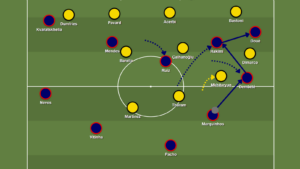
1st minute: Buildup from PSG plays through the Inter midfield. As Marquinhos took the ball forward, Mkhitaryan had jumped higher than his teammates to meet him, only for Dembélé to maintain separation and collect the ball. As Hakimi shifted forward to the halfspace, Ruiz dropped between Barella and Çalhanoğlu, whilst the Turkish midfielder had not tracked Hakimi’s run. Dembélé broke the lines to Hakimi and Doué was free to receive from Hakimi.
Once Doué dribbled inward, Ruiz took up the wide spot to receive from Mendes’ switch, and Hakimi made a third man run into the box. Good access for Enrique’s team, early in the final, but Dimarco blocked the cutback this time around. The match was likely to follow these early dynamics, although Inter showed no signs of breaking this trend without a change in the game state.
Dimarco in despair
And so, the game state changed. One curious choice from Inzaghi was to keep his wing-backs in spaces between the midfield and defensive lines. This only appeared situationally, but Dembélé, Doué and Kvaratskhelia had the reigns to challenge the wide center-back directly. Ten minutes in and Vitinha knocked a pass wide to Hakimi, only for the fullback to find Dembélé on the touchline. The French attacker was already behind Dimarco and flowed past Bastoni. His shot was straight at Sommer but Inter would not learn their lesson.
A few minutes later, PSG broke down a potential Inter routine, a strong counterpress, one of the common themes throughout the first period. Vitinha found Kvaratskhelia behind Dumfries, even though Inter had practically reset in their passive medium-to-low block. The Georgian found Ruiz and he knocked the ball back to Vitinha, only for a passing lane to open through five Inter players and into Doué’s curved run. Dimarco darted five yards behind the defensive line to block out a near-post run from Hakimi, only for the fullback to stop his move and receive Doué’s squared pass. A tap-in for the former Inter player.
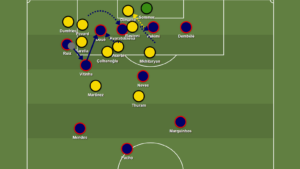
11th minute: Buildup to PSG’s first goal. After Kvaratskhelia’s carry, Ruiz played back to Vitinha and the passing lane opened directly inside the Inter box. Doué’s curved run was found and Hakimi sold a near-post run for Dimarco, only to tap the ball past Sommer between the Inter posts.
A goal down, Inter had to show more ambition out-of-possession. The front two started to jump more, with the wing-backs in support, without getting near the defensive line in possession. Once more, Inter could not solve the problems in the center; PSG could still circulate the ball into wide positions as long as Inzaghi’s team faced an overload on the far side of their arrangement.
The first time that Inter had all eleven players in the opposition half had grave consequences. After they attempted one of their long throw-in routines, play broke for Kvaratskhelia to charge up the pitch, Dembélé and Ruiz in support. Dembélé would receive and carry against Acerbi, only to slow down play and wait for two additional runners. Dimarco faced three PSG shirts at the back post and the switch would find Doué, the Italian wing-back was in a good position to block, but his turned back was a poor look as the shot deflected past Sommer and in for PSG’s second in quick succession.
Inter in constraints
After the shock of two quick goals, Inter had periods where they tried to produce deep buildup movements or trademark transitional plays to get them up the pitch. This involved some standard dynamics through Acerbi being positioned higher than his center-back counterparts when Sommer had possession, or being tilted to other positions as one of the center-midfielders filtered into the first line of the buildup.
There are plenty of reasons why their usual rotations have not worked as well in the past twelve months, but it was expected that time to catch up on fitness could refine some of their better moves in time for Munich, only for PSG’s excellent press to put a pin through those ambitions. The high block was led by Dembélé, who constantly jumped inwards onto Sommer to give the Swiss goalkeeper no time in possession.
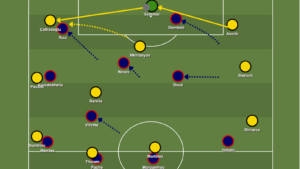
14th minute: High press from PSG. As the ball moved from left to right, Dembélé charged to force Sommer away from passing back towards the same channel. This enabled Ruiz to directly jump onto Çalhanoğlu, as that side of the defensive block is in an optimal position to deal with a long ball towards the strikers. This phase saw an attempted long ball from the Turkish midfielder being blocked.
Behind Dembélé was a man-marking system that harmed Inter’s ability to play through the lines. When Pavard or Bastoni tried to move up the chain, Kvaratskhelia and Doué followed to maintain distance. When Çalhanoğlu tried to drop into the right center-back spot, Ruiz followed and jumped if needed. When Dimarco or Mkhitaryan dropped to support Bastoni, Hakimi and Neves jumped so that very little time was afforded for Inter to open themselves up and accurately find either striker, both struggled with the balls that were launched towards them.
As the ball funnelled from side to side, PSG were well prepared to face the second ball. When it was positioned on Inter’s right side, Doué shifted over to keep central compactness, whilst the PSG midfield matched that of their opponent. Mkhitaryan or Barella’s movements were not adventurous enough to support direct play nor buildup through the lines, so Neves and Vitinha did not need to mark their opponent as tightly as Inter may have benefited from. As a result, when the ball found Thuram or Martínez, Vitinha or Neves could collapse onto the striker and PSG were very effective in compacting the area around their first touches.
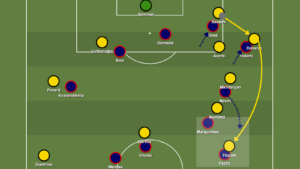
23rd minute: Deep buildup from Inter being pressed by Inter. Acerbi was left as a free man by the PSG block, but the intensity of the press did not make this a favorable option. Instead, Dimarco hit a channel pass towards Thuram, only for Pacho, Neves and Marquinhos to form a triangle around the striker upon his first touch. Neves made the turnover.
PSG took more risks in their off-ball approach. With Dembélé constantly tormenting Sommer, this left Acerbi as the free man in some phases when the ball had been knocked out wide. However, Inter were not willing to play this pass: firstly, the intensity that PSG had set meant that this was not a smooth option back inside, and secondly, Neves or Hakimi would be in a position to engage in the pressing trap just behind Doué’s pressure onto Bastoni.
If Inter were to get back into this game, it would come from one of their set plays that have been the pinnacle of their offensive work for a while. Thuram came closest from a corner just after the half-hour mark, but the occasional connections, when one of the wing-backs was found, were not capitalized from a slow and limited attack. The first half concluded with a PSG passage that came in a more direct manner. Ruiz was free between the lines to turn and make a lofted pass into Doué’s run on the left touchline. At the back post, it was Dembélé’s turn to charge, Dimarco following too deep and watching the ball bounce past him. The Frenchman should have made it three, but PSG had completed a very strong first half in Munich.
PSG potion causes Inter implosion
Warning signs arose twenty seconds into the second period, when a turnover from Neves led directly into a three-versus-two on the left side and Kvaratskhelia tried to repeat his crazy near-post finish, which he produced against Aston Villa. Inter was not dominated on the possession count, but the loss of the ball in the opposition half could lead to a very quick slap back from PSG, who were so much more dangerous on the attack.
Constant transitions down the left side of PSG were starting to formulate. Inzaghi made his first changes nine minutes into the second half. Pavard and Dimarco were replaced by Yann Bisseck and Nicola Zalewski, Inzaghi doubled down on set plays to try and get themselves back into the final, but PSG easily handled these moments after facing multiple phases at the start of the second period. Inzaghi was forced to take off Bisseck just eight minutes after he came on due to injury, so Matteo Darmian came on, and Mkhitaryan was also exchanged for Carlos Augusto, a move that saw Zalewski come into the midfield.
Nevertheless, the script had already been laid out, and PSG grabbed a third in fantastic fashion. A short free-kick was worked backwards to Marquinhos, on the edge of his defensive third, and Vitinha began to run. Acerbi tracked Dembélé peeling towards the left, only for the backheel to reconnect with Vitinha’s carry and into the gaping hole between the Inter defenders. Doué was found, and an excellent near-post finish added a third to the tally.
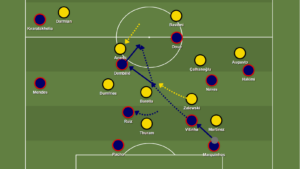
62nd minute: Buildup to PSG’s third goal of the game. Vitinha was able to carry the ball through multiple lines, as Dembélé backheeled the ball back into the Portuguese midfielder’s path.
Sadly for Inter, this would not be the end of the slaughter, even after Doué was taken off for Barcola, shortly after he had scored his second goal of the game. Barcola almost had an instant impact by charging through on the right side, and Mendes was a backheel away from scoring close to the goal. In the end, it would be another deep transition that did Inzaghi’s team again. This time Mendes took the ball off Dumfries and Dembélé produced a wonderful through ball for Kvaratskhelia. Sommer dived, but the Georgian aimed for the front post and PSG had added a fourth to the proceedings.
That was not the end of the humiliation ritual. Barcola skinned Acerbi inside the penalty area, after a carry from the halfway line. He fooled Sommer too, only for his near-post shot to hit the side netting. Enrique made a triple substitution with five minutes left, one of these introducing Senny Mayulu to the field. Inter tried to press high on Donnarumma, but PSG made a quick exit through Neves, moving to the touchline on the right. Inter tried to recover, but one-twos between Barcola and Mayulu maintained possession, only for Barcola to slip Mayulu through and his shot fired past Sommer for the fifth. No need for additional time from the officials, PSG had completed the ultimate demolition job.
Takeaways
Some finals are remembered more than others. What makes this even more astounding is the fact that this scoreline was never on the cards between two teams that were expected to play out an even contest. Luis Enrique had faced plenty of criticism for stale positional plans with very little productivity: at PSG, his ideas have been backed by players with incredible dribbling abilities to open up space and rotations to engineer a lot of risky shapes in the final third.
Whilst PSG have incredible carrying capabilities, Inter do not have any to replicate that. A defeat so damaging that it’s rocked the core of the Inter arrangement, despite them facing one of the best technical teams that European football has faced in a long time. And with a squad so young, with an unlimited budget, is this just the beginning for PSG?
Use the arrows to scroll through all available match plots. Click to enlarge.
Check the match plots page for plots of other matches.




Comments